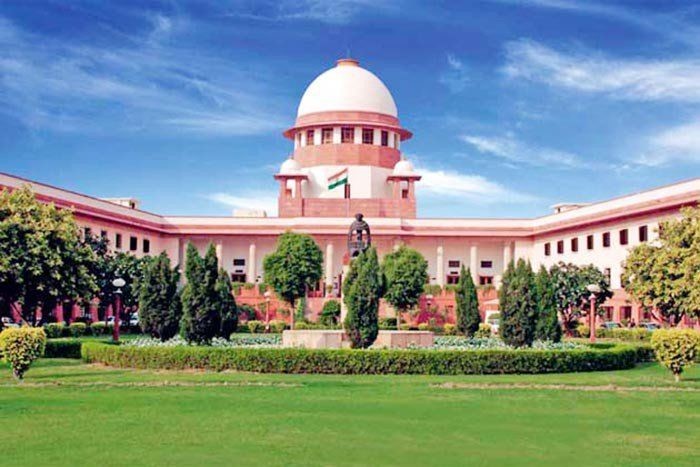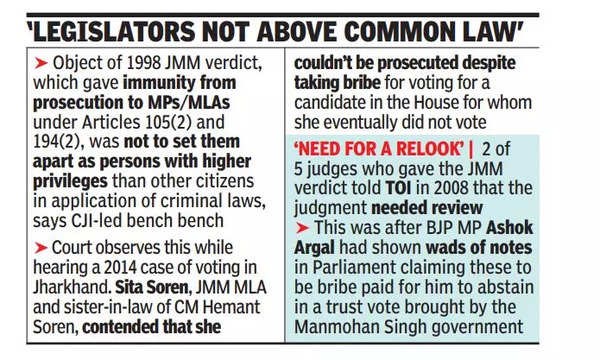Description

Disclaimer: Copyright infringement not intended.
Context
- The Supreme Court is set to decide if legislators (MPs and MLAs) enjoy immunity from bribery charges in connection with votes made in Parliament and Legislative Assemblies.
Constitutional Provisions
- Article 194(2) of the Constitution provides immunity for members of the Legislature of a State, and Article 105(2) provides identical protections to members of Parliament.
- Article 105 of the Constitution deals with the powers, privileges, and immunities of Parliament and its members.
- Article 105(2) states that no MP shall be liable to any court proceedings for anything said or any vote given in Parliament or its committees.
Background
- In 1998, the Supreme Court interpreted the above mentioned articles literally in the P.V. Narasimha Rao case, holding that legislators enjoy immunity from criminal prosecution for bribery related to their speech and votes in Parliament and Legislative Assemblies.
- In 2007, another Supreme Court Bench ruled that individuals who took money to ask questions in Parliament could be permanently expelled from the House.
- In 2023, a five-judge bench headed by the Chief Justice of India referred a case regarding parliamentary immunity to a seven-judge bench to clarify if such immunity extends to prosecution for demanding or taking a bribe.
- A seven-judge bench led by Chief Justice of India D.Y. Chandrachud is now reconsidering this judgement.

Reason for Reconsideration
- The case involves an MLA from the Jharkhand Mukti Morcha (JMM), Sita Soren, accused of accepting a bribe for her vote during the 2012 Rajya Sabha elections.
- A five-judge bench led by CJI Chandrachud demarcated three issues for reconsideration:
- The purpose of Articles 194(2) and 105(2) is to allow legislators to cast their votes without fear, not to protect them from criminal law violations.
- The decision in P.V. Narasimha would seemingly protect bribe-takers who vote by the bribe's purpose, not those who act contrary to it.
- The bench needs to decide if the offense of bribery is complete when the bribe is paid or when it is acted upon by the legislator.
Arguments in Favour of Immunity
- Senior Advocate Raju Ramachandran argued that legislators have absolute protection from court proceedings under the concerned articles.
- He disagreed with Justice Agarwal’s dissent in P.V. Narasimha, which suggested that immunity should not apply if a legislator does not give a speech or cast a vote.
- Ramachandran argued that the majority in P.V. Narasimha chose to “read the Constitution as written.
- It enables legislators to express their views openly without concern for legal consequences.
- Immunity allows lawmakers to act independently without fear of legal repercussions.
- It ensures uninterrupted representation and preserves the balance of power in a democracy.
Arguments in Favour of Overruling P.V. Narasimha:
- Senior Advocate P.S. Patwalia argued that the offence of bribery is complete when money is accepted, regardless of subsequent actions.
- Senior Advocate Gopal Sankaranarayanan argued that illegitimate actions by legislators, like bribes for votes, that directly interfere with legislative processes should not be protected.
- Solicitor General Tushar Mehta argued that the majority in P.V. Narasimha failed to consider the Prevention of Corruption Act, 1988, which specifically punishes public servants who accept bribes.

In a nutshell,
- Legislative immunity may be exploited as a political tool to target opponents or shield members of the ruling party from legal scrutiny.
- Immunity can lead to political misuse as it can be used to evade accusations or inquiries unrelated to legislative duties.
- Legislators may become less accountable for their actions and less responsive to public concerns if they feel immune from legal consequences.
- Legal proceedings involving legislators may be delayed compared to those involving regular individuals.
- Legislative immunity provides specific legal protections to certain individuals, creating inequality in the application of the law.
- Legislative immunity can hinder investigations into legislative misconduct, obstructing efforts to address wrongdoing in the political sphere.
- Legislators may be perceived as being above the law, leading to a loss of public trust.
- The application of legislative immunity can lead to complex legal interpretations, making it challenging to determine when immunity applies and in what circumstances.
- Legislative immunity can enable corrupt or unethical behavior without the fear of legal consequences.

Way Forward:
- Ensure transparency in legal proceedings involving legislators.
- Support investigative journalism and strengthen civil society watchdog groups.
- Prevent the abuse of immunity for purposes unrelated to legislative duties.
- Establish impartial ethics committees to investigate ethical breaches by lawmakers.
- Educate the public on their rights and the role of lawmakers in governance.
- Strengthen laws and enforcement procedures against corruption.
- Encourage voters to consider the behavior of lawmakers while casting their votes.
- Regularly review legislative immunity regulations and make necessary changes.
Conclusion:
- This case is significant as it addresses the balance between legislative immunity and accountability, with implications for the fight against corruption in India.
|
PRACTICE QUESTION
Q. Which case led to the interpretation that legislators enjoy immunity from criminal prosecution for bribery related to their speech and votes in Parliament and Legislative Assemblies?
A) P.V. Narasimha Rao case
B) Sita Soren case
C) Prevention of Corruption Act, 1988
D) Jharkhand Mukti Morcha (JMM) case
Answer. A)
PRACTICE QUESTION
Q. Discuss legislative immunity in India, including constitutional provisions and recent judicial developments regarding bribery allegations. Evaluate arguments for and against immunity and suggest measures for enhancing accountability in the parliamentary system.
|












